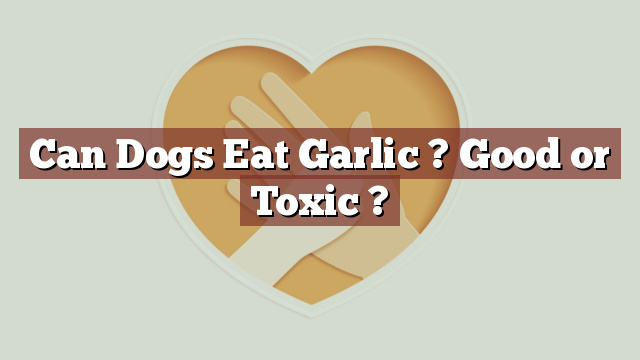Can Dogs Eat Garlic? Good or Toxic?
When it comes to our furry friends, it is essential to be aware of what foods are safe for them to consume. Garlic, a commonly used ingredient in many human dishes, raises the question: can dogs eat garlic? Let’s delve into the nutritional value of garlic, its potential risks, and the benefits it may offer our four-legged companions to make an informed decision.
Nutritional Value of Garlic: What Does it Provide for Dogs?
Garlic contains several essential nutrients that can be beneficial for both humans and dogs. It is a rich source of vitamins B6 and C, manganese, and selenium. Additionally, it contains small amounts of calcium, phosphorus, and potassium. Garlic also contains sulfur compounds, such as allicin, which is believed to have potential health benefits.
Can Dogs Eat Garlic? Unveiling the Safety Concerns and Toxicity.
The answer to the question "can dogs eat garlic?" is no. While garlic may offer nutritional benefits, it can be toxic to dogs. Garlic belongs to the Allium family, which also includes onions and chives. These foods contain compounds that can lead to the destruction of red blood cells in dogs, causing a condition known as hemolytic anemia.
Scientific studies have shown that even small amounts of garlic can be harmful to dogs. The toxic compounds in garlic can build up in a dog’s system over time, leading to potential health complications. Therefore, it is best to avoid feeding garlic to dogs altogether.
Potential Risks or Benefits of Feeding Garlic to Dogs.
Feeding garlic to dogs can pose significant risks to their health. The toxic substances in garlic can cause anemia, leading to symptoms such as weakness, lethargy, pale gums, and even collapse. In severe cases, it can even be life-threatening.
While some may argue that garlic has potential health benefits, such as its reported antibacterial and antifungal properties, these potential benefits are outweighed by the risks it presents to dogs. There are other safe alternatives available that can provide similar benefits without the associated dangers.
Dog Ate Garlic: Steps to Take and When to Seek Veterinary Help.
If you suspect that your dog has consumed garlic, it is crucial to act promptly. Even a small amount can be harmful, especially to smaller breeds. Contact your veterinarian immediately for guidance. The vet may induce vomiting or recommend other treatment options depending on the amount of garlic ingested and the condition of the dog.
Symptoms of garlic toxicity may not be immediately apparent, so it is essential to monitor your dog closely. If you notice any signs of weakness, pale gums, or unusual behavior, seek veterinary help immediately.
Conclusion: Weighing the Pros and Cons, Making an Informed Decision.
In conclusion, dogs should not eat garlic due to its toxic nature. While garlic does possess some potential health benefits, the risks outweigh any advantages it may offer. It is crucial to prioritize the well-being of our furry friends and provide them with a safe and nutritionally balanced diet. If you have any doubts or concerns about your dog’s diet, consult with a veterinarian, who can offer tailored advice based on your dog’s specific needs and health condition.
Thank you for investing your time in exploring [page_title] on Can-Eat.org. Our goal is to provide readers like you with thorough and reliable information about various dietary topics. Each article, including [page_title], stems from diligent research and a passion for understanding the nuances of our food choices. We believe that knowledge is a vital step towards making informed and healthy decisions. However, while "[page_title]" sheds light on its specific topic, it's crucial to remember that everyone's body reacts differently to foods and dietary changes. What might be beneficial for one person could have different effects on another. Before you consider integrating suggestions or insights from "[page_title]" into your diet, it's always wise to consult with a nutritionist or healthcare professional. Their specialized knowledge ensures that you're making choices best suited to your individual health needs. As you navigate [page_title], be mindful of potential allergies, intolerances, or unique dietary requirements you may have. No singular article can capture the vast diversity of human health, and individualized guidance is invaluable. The content provided in [page_title] serves as a general guide. It is not, by any means, a substitute for personalized medical or nutritional advice. Your health should always be the top priority, and professional guidance is the best path forward. In your journey towards a balanced and nutritious lifestyle, we hope that [page_title] serves as a helpful stepping stone. Remember, informed decisions lead to healthier outcomes. Thank you for trusting Can-Eat.org. Continue exploring, learning, and prioritizing your health. Cheers to a well-informed and healthier future!

